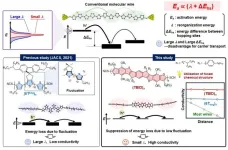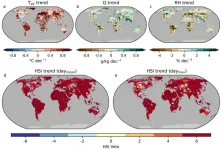(Press-News.org) Long-term exposure to arsenic, a hidden danger in many New England drinking water supplies, poses serious health risks, including cancer and cognitive challenges. A groundbreaking citizen science initiative called "All About Arsenic" has emerged in response, empowering students and communities to tackle such health threats head-on.
The benefits are detailed in a peer-reviewed article published today in the journal Environmental Health Perspectives. An accompanying commentary by researchers at Columbia University’s Mailman School of Public Health calls the effort a blueprint for federal investments that can leverage youth engagement to advance “water justice”.
Launched in 2016 by Jane Disney. Ph.D., and her team at MDI Biological Laboratory’s Community Environmental Health Laboratory, the “All About Arsenic" program works with secondary school teachers, students, and scientist partners in Maine and New Hampshire to address drinking water issues related to private water sources.
The initiative turns students into citizen scientists who collect well water samples for analysis of arsenic and other toxic metals. Funded initially with an EPA Environmental Education grant and a National Institute of General Medical Sciences (NIGMS) Science Education Partnership Award (SEPA), the project not only boosts awareness but also drives action to protect public health.
The program grew to include 27 schools over the study period, with students analyzing more than 3,000 water samples. The findings are concerning: 752 (nearly 25% of samples) revealed arsenic levels exceeding five parts per billion, the maximum contaminant level set by New Hampshire. In one extreme case, a sample collected by a Maine student registered a staggering 718 ppb, far above the U.S. standard for municipal water.
"Our research highlighted that many residents are unaware of the risks or haven't tested their water supplies," says Dr. Disney. "By involving students, we not only increase awareness but also empower them to drive policy changes that safeguard their communities."
The program’s impact is multi-faceted, leading to increased water-testing rates, improved data literacy, direct risk mitigation, and more robust toxins databases. In a significant public health victory, students’ testimonies contributed to the passage of legislation in Maine that enables the state housing authority to provide remediation grants for low-income households with contaminated wells.
"The power of citizen science in schools is clear," Disney adds. "Students and teachers can be catalysts for change, driving policy and contributing to improved public health outcomes."
Funded initially with an EPA Environmental Education grant and a National Institute of General Medical Sciences (NIGMS) Science Education Partnership Award (SEPA), the project not only boosts awareness but also drives action to protect public health.
The "All About Arsenic" project continues to grow, with a second NIH SEPA grant funded through the National Institute of Nursing Research, focusing on science communication and intergenerational learning.
For more information, visit www.allaboutsarsenic.org, or contact:
END
Students' toxin research shows public health benefits of citizen science
New research: School-based data collection improves risk awareness and environmental equity
2024-08-21
ELSE PRESS RELEASES FROM THIS DATE:
Molecular wires with a twist
2024-08-21
Osaka, Japan – From the high-voltage wires that carry electricity over long distances, to the tungsten filaments in our incandescent lights, we may have become accustomed to thinking that electrical conductors are always made of metal. But for decades, scientists have been working on advanced materials based on carbon-based oligomer chains that can also conduct electricity. These include the organic light-emitting devices found in some modern smartphones and computers.
In quantum mechanics, electrons are not just point particles with definite ...
The power of play: Strengthening senior wellbeing through generational bonds
2024-08-21
Watching your children frolic through a playground is one of the many joys of being a parent or grandparent, but new research has found that engaging in play with kids could help improve mental health.
Researchers from the University of South Australia (UniSA) and the University of Canberra (UC) have explored the benefits of intergenerational play through specially designed playgrounds for kids and adults.
Intergenerational play brings young children and older people together to engage in enjoyable and creative activities such as storytelling, using playground equipment, and games.
The world is facing an ...
The underrated impact of humidity
2024-08-21
Governments, medical institutions and other bodies require accurate models on health-related matters in order to better organize their activities. Climate change has measurable impacts on society, including on human mortality. However, current models to assess the health impacts of climate change do not account for every environmental parameter, especially humidity, which could influence heat stress perceived by the human body, leaving room for improvement. For the first time, researchers, including those from the University of Tokyo, successfully incorporated humidity data from hundreds of cities into so-called heat stress indicators ...
Sharing risk to avoid power outages in an era of extreme weather
2024-08-21
In brief
Extreme weather is leading to more frequent power grid strain and electricity outages.
There are a range of regional cooperation agreements among utilities to share electricity.
Expanding cooperation areas in the West could cut outage risks by as much as 40%.
Expanding cooperation among electricity providers could also help ensure public opinion and policy remain favorable for renewable energy growth.
This summer’s Western heat waves raise the specter of recent years’ rotating power outages and record-breaking electricity demand in the region. ...
Gut bioelectricity provides a path for bad bacteria to cause diseases
2024-08-21
How do bad bacteria find entry points in the body to cause infection?
This question is fundamental for infectious disease experts and people who study bacteria. Harmful pathogens, like Salmonella, find their way through a complex gut system where they are vastly outnumbered by good microbes and immune cells. Still, the pathogens navigate to find vulnerable entry points in the gut that would allow them to invade and infect the body.
A team of UC Davis Health researchers has discovered a novel bioelectrical mechanism these pathogens use to find these openings. Their study was ...
RPI and Hokkaido University sign letter of intent for semiconductor collaboration
2024-08-21
Today, Rensselaer Polytechnic Institute and Hokkaido University of Japan announced their plan to explore collaborative opportunities in semiconductor education and research contributing to semiconductor workforce development initiatives.
The two universities recognized the new partnership with a letter of intent signing ceremony held in the Curtis R. Priem Experimental Media and Performing Arts Center, with representatives from the Hokkaido Prefecture government, the Japanese semiconductor company Rapidus, IBM, NY CREATES, and RPI faculty and students in attendance.
Before the signing ceremony, the Japanese delegation toured the IBM Quantum System One ...
Just 1-2 cigarettes/day before or during pregnancy linked to major newborn health problems
2024-08-21
Even light smoking of just 1-2 cigarettes a day either before or at any time during pregnancy is significantly associated with major health problems in the newborn, finds research published online in the Journal of Epidemiology & Community Health.
The findings add to the evidence indicating that women hoping to become, or who are, pregnant should stub out smoking to protect their newborn’s health, say the researchers.
Deaths and serious health issues among newborns have fallen sharply, largely due to improvements in maternity care. But admission ...
Social position linked to food delivery preferences in England
2024-08-21
Social position—defined by household income and job role—is linked to food delivery preferences in England, suggests an analysis of consumer research published in the open access journal BMJ Public Health.
Affluent households are twice as likely as less well off ones to shop online for groceries while households in lower social grades are up to twice as likely to use food delivery apps for take-away meals. And users of these apps are more likely to be living with obesity, the findings indicate.
Digital on-demand ...
20 minutes of mindful breathing can rapidly reduce intensity of cancer pain
2024-08-21
Twenty minutes of mindful breathing, which focuses a person’s attention on their breath, can rapidly reduce the intensity and unpleasantness of cancer pain and relieve the associated anxiety, suggest the findings of a small comparative study, published online in the journal BMJ Supportive & Palliative Care.
Mindful breathing complements traditional pain relief and broadens the repertoire of options available for cancer patients, say the researchers.
Moderate to severe pain affects an estimated 30-40% of patients with cancer worldwide, as a result of the tumour compressing or ...
Hospital bacteria tracked better than ever before with new technique
2024-08-21
Researchers have developed a new genomic technique that can track the spread of multiple superbugs in a hospital simultaneously, which could help prevent and manage common hospital infections quicker and more effectively than ever before.
The proof-of-concept study, from the Wellcome Sanger Institute, the University of Oslo, Fondazione IRCCS Policlinico San Matteo in Italy, and collaborators, details a new deep sequencing approach that captures all the common infectious bacteria in a hospital at once. Current methods culture and sequence all pathogens separately which takes longer and requires more work.
Published ...
LAST 30 PRESS RELEASES:
Visible light-driven deracemization of α-aryl ketones synergistically catalyzed by thiophenols and chiral phosphoric acid
Most AI bots lack basic safety disclosures, study finds
How competitive gaming on discord fosters social connections
CU Anschutz School of Medicine receives best ranking in NIH funding in 20 years
Mayo Clinic opens patient information office in Cayman Islands
Phonon lasers unlock ultrabroadband acoustic frequency combs
Babies with an increased likelihood of autism may struggle to settle into deep, restorative sleep, according to a new study from the University of East Anglia.
National Reactor Innovation Center opens Molten Salt Thermophysical Examination Capability at INL
International Progressive MS Alliance awards €6.9 million to three studies researching therapies to address common symptoms of progressive MS
Can your soil’s color predict its health?
Biochar nanomaterials could transform medicine, energy, and climate solutions
Turning waste into power: scientists convert discarded phone batteries and industrial lignin into high-performance sodium battery materials
PhD student maps mysterious upper atmosphere of Uranus for the first time
Idaho National Laboratory to accelerate nuclear energy deployment with NVIDIA AI through the Genesis Mission
Blood test could help guide treatment decisions in germ cell tumors
New ‘scimitar-crested’ Spinosaurus species discovered in the central Sahara
“Cyborg” pancreatic organoids can monitor the maturation of islet cells
Technique to extract concepts from AI models can help steer and monitor model outputs
Study clarifies the cancer genome in domestic cats
Crested Spinosaurus fossil was aquatic, but lived 1,000 kilometers from the Tethys Sea
MULTI-evolve: Rapid evolution of complex multi-mutant proteins
A new method to steer AI output uncovers vulnerabilities and potential improvements
Why some objects in space look like snowmen
Flickering glacial climate may have shaped early human evolution
First AHA/ACC acute pulmonary embolism guideline: prompt diagnosis and treatment are key
Could “cyborg” transplants replace pancreatic tissue damaged by diabetes?
Hearing a molecule’s solo performance
Justice after trauma? Race, red tape keep sexual assault victims from compensation
Columbia researchers awarded ARPA-H funding to speed diagnosis of lymphatic disorders
James R. Downing, MD, to step down as president and CEO of St. Jude Children’s Research Hospital in late 2026
[Press-News.org] Students' toxin research shows public health benefits of citizen scienceNew research: School-based data collection improves risk awareness and environmental equity



